Research Team
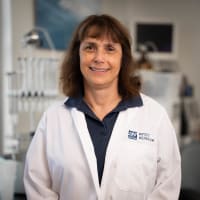
Tracy Romano PhD

Peter Auster PhD
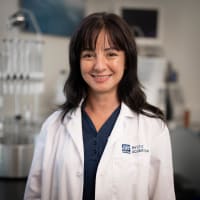
Ebru Unal PhD
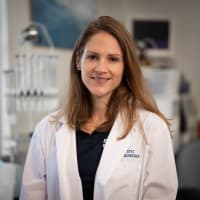
Laura Thompson PhD
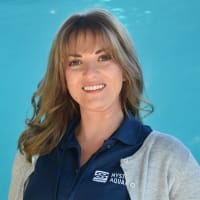
Susan Smith PhD
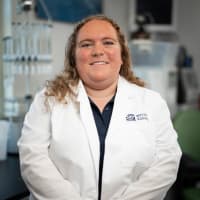
Danielle Lavoie MS

Tracy Romano PhD
VICE PRESIDENT OF BIOLOGICAL RESEARCH & CHIEF SCIENTIST
- Marine mammal neuroimmunology
- Marine mammal stress physiology
- Non-invasive health monitoring
- Marine pathogens
Leading the Mystic Aquarium research team is Dr. Tracy Romano, the founder of the field of marine mammal neuroimmunology and leader in the field of marine mammal health. Romano graduated with a BS in Biology from Saint Michael’s College in Vermont and received her PhD in Neurobiology & Anatomy from the University of Rochester School of Medicine. While a graduate student, Romano spent her summers studying with the U.S. Navy’s Marine Mammal Program in San Diego and investigating neural-immune interactions in the beluga whale. Her postdoctoral work built upon this research to investigate the marine mammal immune system and the impact of stress and the environment on marine mammal health, in collaboration with the Marine Mammal Program and The Scripps Research Institute in La Jolla, California. After her postdoctoral studies, Romano established a research laboratory focused on studying stress and the marine mammal immune system at the Navy Base in San Diego.
In 2004, Romano moved her lab to Mystic Aquarium and is currently the Vice President of Research and Veterinary Services, where she leads a research team focused on aquatic animal health and conservation biology. Among numerous forms of professional recognition, Romano has been an inductee into the Saint Michael’s College Academic Hall of Fame, an American Society for Engineering Education Fellow, a finalist for the Connecticut Technology Council’s Women of Innovation award and a National Research Council Fellow. She serves on multiple scientific advisory panels, was President of the International Association for Aquatic Animal Medicine, has mentored many award-winning students, has created and conducted a nationally recognized science education and cultural exchange program for Native American youth, has led over 15 field expeditions to the Arctic, holds joint appointments at multiple universities and has made significant scientific contributions to the field of aquatic animal health.

Peter Auster PhD
SENIOR RESEARCH SCIENTIST
- Marine ecology
- Biodiversity
- Marine fish behavior
Dr. Peter Auster joined Mystic Aquarium as a senior research scientist in 2011. He is a marine ecologist, and his work focuses on the conservation and sustainable use of biological diversity in the ocean. Although retired from the University of Connecticut, he retains a faculty appointment as a Research Professor Emeritus in the Department of Marine Sciences and has ongoing projects there. For the past 40 years, Auster has conducted studies to understand how the behavior of marine fishes and the dynamics in patterns of habitat use influence their distribution and abundance across underwater landscapes. From an applied science perspective, his most notable work has focused on understanding the ecological effects of fishing and on developing a scientific basis for using marine protected areas as a conservation tool. Auster has led many shore-based projects and has served as a scientist or chief scientist on more than 60 major research cruises in the northwest Atlantic, Bering Sea, Gulf of Alaska, Caribbean Sea, Indian Ocean, South China Sea, Gulf of California and equatorial Pacific.
This fieldwork, which has utilized scuba techniques, research submersibles and remotely operated vehicles, has resulted in more than 140 scholarly and technical publications. Auster serves on multiple panels and committees that are focused on marine resource management and conservation and has been involved in numerous outreach initiatives targeted at informing the public about marine conservation issues. Among numerous forms of professional recognition, Auster is a Pew Fellow in Marine Conservation, was elected a Fellow in the American Institute of Fishery Research Biologists, and was the Mote Eminent Scholar in Fisheries Ecology at Florida State University during the 2010–11 academic year. He also has received a NOAA Environmental Hero Award, a NOAA National Marine Sanctuaries Outstanding Volunteer Service Award and a University of Connecticut at Avery Point Award for Excellence in Teaching.

Ebru Unal PhD
RESEARCH SCIENTIST
- Marine molecular biology
- Marine mammal genomics
- Environmental DNA (eDNA)
- Population genetics of zooplankton
Dr. Ebru Unal joined the Mystic Aquarium research team in 2014. She works on using molecular techniques to assess health and immune status in marine mammals. Unal majored in Molecular Biology and Genetics at Bogazici University in Turkey and received her MSc degree in Marine Sciences at Middle East Technical University in Turkey. During her master’s studies, she focused on zooplankton seasonality and genetics. Her work earned her a fellowship from the University of Washington to serve as a visiting research scientist at the School of Oceanography, where she carried out a population genetic study on copepod species. In 2011, Unal earned her PhD in Oceanography from the University of Connecticut (UConn).
Her main research focus during her PhD studies was on molecular responses of marine zooplankton to environmental conditions and stressors in the North Atlantic Ocean. Unal was appointed as a postdoctoral fellow in the Department of Marine Sciences at UConn until 2013, and was later named an Assistant Research Scientist in the UConn Marine Sciences and Technology Center. During her research career, Unal has utilized population genetics, gene expression profiling, transcriptomic, and functional genomic approaches. At the Aquarium, she is currently working on investigating the genome-wide gene expression responses of marine mammals to various environmental and anthropogenic stressors. She is also working on developing methodologies for environmental DNA (eDNA) detection for marine mammals and sea turtles.

Laura Thompson PhD
RESEARCH SCIENTIST
- Marine mammal and comparative dive physiology
- Dive-related injury and disease
- Immunology
- Animal health
- Non Invasive Techniques
Laura Thompson is a research scientist at Mystic Aquarium. In this role, she is studying the relationship between the immune system, diving, and dive-related injury in marine mammals; investigating the hypothesis that a less-sensitive immune response helps marine mammals avoid the bends; and trying to understand the conditions that may lead to dive-related injury and disease. Thompson first came to Mystic Aquarium as a research intern during the summer of 2005, working on the identification and quantification of lymphocyte subsets in wild bottlenose dolphins. Thompson holds a first-class BSc with honors in Marine and Freshwater Biology from the University of London and obtained her PhD in Oceanography from the University of Connecticut (UConn), where she was the first graduate student to complete her degree through a partnership between Mystic Aquarium and UConn’s Marine Science Department at Avery Point. Her main research interest is marine mammal dive physiology and health, including the role of the immune system in the development of dive-related injury and disease. She has travelled to Alaska for health assessments of wild belugas, and has participated in health assessment sampling of grey seals on Monomoy Island, Massachusetts. Thompson is also involved in the development of non-invasive sampling techniques, and has validated a method to collect samples of respiratory vapor, or “blow,” from belugas, in order to measure changes in cortisol, and other markers of health, both in animals at Mystic Aquarium as well as in the field.

Susan Smith PhD
RESEARCH SCIENTIST
- Marine microbes
- Molecular biology
- Marine mammal microbiomes
Susan Smith joined Mystic Aquarium’s research team in fall, 2022, where she studies the diversity and function of marine mammal microbiomes. Smith received a master’s and doctoral degree in Oceanography from University of Connecticut (UConn) studying marine microbes. Her dissertation includes publication of the first tintinnid ciliate genome, the elucidation of ciliate genome architecture, and the taxonomic description of a new ciliate genus and species discovered in Long Island Sound. Her more recent work involves the use of single-cell genomics and transcriptomics to study the structure of marine protist genomes and an adaptation of these methods to characterize cryptic taxa at a species level. Smith has a passion for teaching and enjoyed her time instructing the UConn graduate course Biological Oceanography, as well as mentoring students in the Research Experience for Undergrads (REU) program. Her current interests involve the use of contemporary molecular methods to characterize the prokaryotic and eukaryotic microbiomes of marine mammals. Smith believes that a fine-tuned genetic characterization of host microbiota can inform animal husbandry specialists on the transmission of parasites, serve as early warning health indices, and elucidate population genetics and community structure in wild populations.

Danielle Lavoie MS
RESEARCH TECHNICIAN
- Conservation and education
Danielle graduated from Roger Williams University with a BS in Marine Biology where she studied the growth rate of juvenile oysters. She was also a NOAA Hollings fellow, where she investigated the respiratory physiology of clearnose skates and summer flounder in response to coastal climate change. She received her Master’s degree in Marine Biology from the University of Massachusetts Dartmouth, in which her thesis focused on the temperature tolerance of a parasite invasive to American eels. She also developed a non-lethal detection method for this parasite using digital X-ray technology. She is currently a Research Technician at Mystic Aquarium and is involved in a number of research projects as well as conservation and education initiatives.